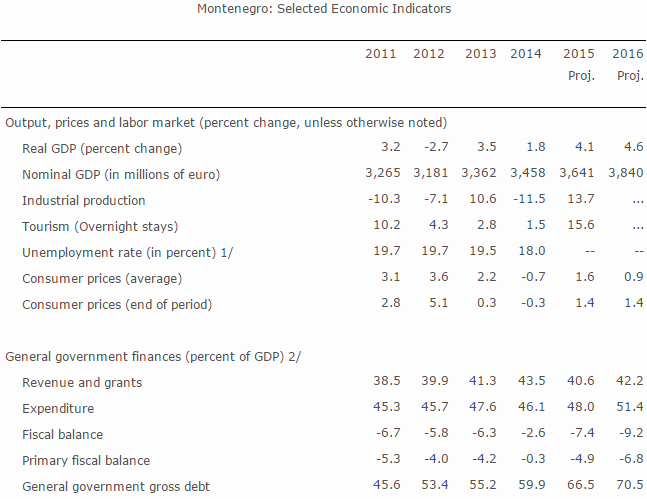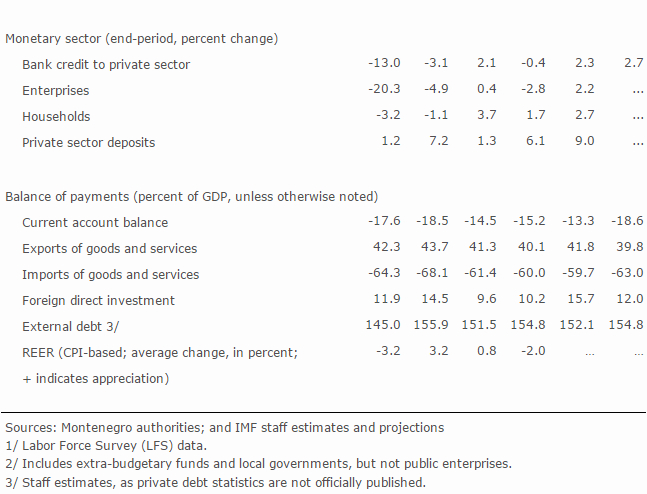IMF Executive Board Concludes 2015 Article IV Consultation with Montenegro
On February 19, 2016 the Executive Board of the International Monetary Fund (IMF) concluded the Article IV consultation with Montenegro.
Montenegro’s economy has rebounded in the past year, and strong growth looks set to continue in 2016, at just over 4 percent. The medium-term outlook is boosted by the construction of the Bar-Boljare highway. The government intends to pursue other fiscal incentives and public infrastructure projects to promote economic development and connectivity. However, although the government’s growth strategy can bring substantial gains, it also carries sizable risks, notably to the public finances. Montenegro also remains vulnerable to fluctuations in external demand and global financial conditions.
Recent fiscal measures that reduce revenues and ease restraints on current spending add to budget pressures from the highway. Even with relatively high growth, staff projects deficits of around 8 percent of GDP over the next three years, contributing to substantial financing needs. During that time, gross public debt is expected to reach 80 percent of GDP, from 66 percent in 2015.
Increased growth should gradually boost bank profitability and allow lending conditions to ease further. Yet low provisioning and weak asset quality remain concerns, and could hold back credit growth if not properly dealt with.
With shrinking fiscal buffers, and because the economy lacks control over its own currency, the ability to absorb shocks depends crucially on the flexibility and competitiveness of the real economy. Low labor productivity and employment hold back potential growth. In this context, the process of aligning labor laws with those of the EU provides an opportunity to improve the flexibility of labor market outcomes, boost participation rates, and reduce informality.
Executive Board Assessment
Executive Directors welcomed Montenegro’s strong growth performance and the favorable outlook. However, they noted that the heavy reliance on large infrastructure projects to support growth also poses risks to fiscal and external sustainability. Accordingly, Directors emphasized the need for sound macroeconomic policies to address these risks. They also encouraged the authorities to reduce financial sector vulnerabilities and to implement structural reforms to boost potential growth and increase resilience.
Directors welcomed the authorities’ commitment to address vulnerabilities and looked forward to the preparation of a credible fiscal consolidation plan. They underscored the need for immediate and durable consolidation measures to maintain sustainability, contain risks, and preserve market access. In this context, they observed that new pension provisions and social allowances, planned public wage hikes, and strategic tax incentives would add to budget pressures. They called for measures to contain the public sector wage bill, improve the sustainability of the pension system, and strengthen revenue collection to reduce the public debt to GDP ratio to 60 percent of GDP over the medium term. Directors suggested that these policy measures be complemented with a stronger fiscal framework, including detailed medium-term plans and public financial management reform.
Directors noted that the financial system is largely stable, and that bank capitalization and liquidity appear adequate in general. However, the still high level of non-performing loans, low provisioning and bank profitability, and weak asset quality are sources of vulnerability. Directors recommended that policy recommendations from the Financial Sector Assessment Program be implemented to address these vulnerabilities. In particular, Directors noted the need for an independent asset quality review of banks and measures to enhance emergency liquidity assistance. They also recommended that steps be taken to enhance the regulatory, supervisory and resolution frameworks, and to develop the macro-prudential framework.
Directors emphasized that structural reforms should help boost potential growth and competitiveness. Specifically, they noted the need to improve labor market flexibility and the investment environment, and to reduce non-wage disincentives to employment.


Source: International Monetary Fund
- 328 reads
Human Rights
Ringing FOWPAL’s Peace Bell for the World:Nobel Peace Prize Laureates’ Visions and Actions

Protecting the World’s Cultural Diversity for a Sustainable Future

The Peace Bell Resonates at the 27th Eurasian Economic Summit

Declaration of World Day of the Power of Hope Endorsed by People in 158 Nations

Puppet Show I International Friendship Day 2020

